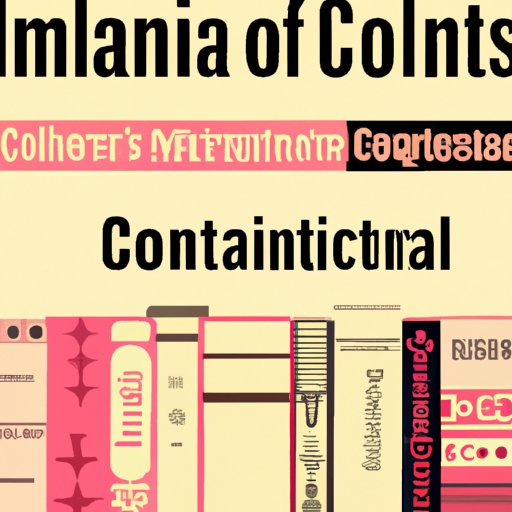Introduction
Colonial literature is a type of literature that emerged during the period of European colonization of other countries and cultures. It is an important part of literary history, as it provides insight into the experiences of colonized people and the power dynamics between colonizers and colonized. This article will explore the various themes typically found in colonial literature, such as imperialism, oppression, race, gender, religion, language and identity.
Imperialism and Expansionism
Imperialism and expansionism are two closely related concepts that refer to the practice of one nation extending its political or economic control over another. In colonial literature, these themes often manifest as stories of conquest, subjugation, and exploitation of native populations by Europeans. For example, Joseph Conrad’s novel Heart of Darkness (1899) tells the story of a British sailor traveling up the Congo River on a mission for a Belgian trading company. The novel explores the themes of imperialism, colonialism, and racism through its depiction of the brutal treatment of local people by the European colonizers.
Themes of Oppression and Colonialism
Oppression and colonialism are closely linked themes in colonial literature. Oppression refers to the systematic mistreatment and discrimination of certain groups of people by those in power, while colonialism is the process of one country taking control of another. In colonial literature, these themes are often explored through stories of subjugation and resistance. For instance, Chinua Achebe’s Things Fall Apart (1958) tells the story of an African village struggling against the oppressive rule of British colonists. Through this narrative, Achebe examines the devastating effects of colonialism on African culture and society.
Race, Gender, and Social Class
In colonial literature, race, gender, and social class are often used as ways to explore power dynamics between different groups of people. These themes are often explored through stories of marginalization and discrimination. For example, Maryse Condé’s novel I, Tituba, Black Witch of Salem (1986) tells the story of a Caribbean slave girl accused of witchcraft during the 1692 Salem witch trials. Through this narrative, Condé examines the intersection of race, gender, and class in colonial America and its impact on the lives of marginalized people.
Religion and Spirituality
Religion and spirituality are common themes in colonial literature. These themes often manifest as stories of religious conversion, spiritual exploration, and clashes between different belief systems. For example, Graham Greene’s novel The Power and the Glory (1940) tells the story of a Catholic priest struggling with his faith while living in a Mexican state where Catholicism has been outlawed. Through this narrative, Greene examines the complexities of religious faith in a colonial context.
Language and Identity
Language and identity are closely linked themes in colonial literature. These themes are often explored through stories of cultural assimilation, linguistic suppression, and the search for one’s own voice. For instance, Jamaica Kincaid’s novel Annie John (1985) tells the story of a young girl growing up in Antigua, who grapples with her identity as she navigates the conflicting values of her native culture and British colonialism. Through this narrative, Kincaid examines the complex relationship between language and identity in a colonial context.
Exploring the Colonizer-Colonized Relationship
Another common theme in colonial literature is the exploration of the dynamic between colonizers and colonized. This theme is often explored through stories of resistance, collaboration, and negotiation between different groups. For example, Aimé Césaire’s play Une Tempête (1969) tells the story of a group of African slaves who use their wit and cunning to gain freedom from their French oppressors. Through this narrative, Césaire examines the complex relationship between colonizers and colonized.
Conclusion
In conclusion, colonial literature is an important part of literary history, as it provides insight into the experiences of colonized people and the power dynamics between colonizers and colonized. This article has explored some of the common themes typically found in colonial literature, such as imperialism, oppression, race, gender, religion, language and identity. Through these stories, authors have examined the complex relationships between colonizers and colonized, and the lasting impacts of colonialism on the cultures and societies it touched.
(Note: Is this article not meeting your expectations? Do you have knowledge or insights to share? Unlock new opportunities and expand your reach by joining our authors team. Click Registration to join us and share your expertise with our readers.)
